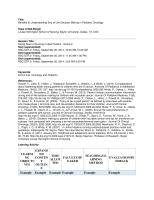| dc.description.abstract | Session presented on Friday, September 26, 2014: Purpose: It is estimated that 1,960 pediatric patients will die of cancer in the United States in 2014 and approximately 15,780 new diagnoses will be made (Ward, DeSantis, Robbins, Kohler, & Jamal, 2014, p. 75). Parents report end-of-life decisions to be the most difficult treatment-related decisions they face and clinicians (nurses, nursing assistants, nurse practitioners, physicians, and specialty healthcare personnel) perceive the assistance they can offer with these decisions to be inadequate (Hinds et al., 2005, p. 9146). Research is being done regarding: the end-of-life decision-making process; the corresponding satisfaction outcomes for the family and clinicians; and the cognitive level of understanding and preferences of the terminal child. The end-of-life decision making process is relevant to nursing because nurses work with the patients and their families to develop the daily plan of care and act as advocates when collaborating with members of the healthcare team. Pediatric oncology nurses often become close to their patients and families and would logically be the most available resource to consult when making these end-of-life decisions. Therefore, a better understanding of how these decisions are made and the scope of impact to the patient, family, and the healthcare team allows the nurse to implement interventions to attain a higher level of care and satisfaction. Methods: Five studies were selected for this research synthesis. These studieswere located in CINAHL utilizing key words such as: pediatric oncology, end-of-life, palliative care, ethics, and oncology nursing. All five articles were qualitative in nature and the evidence in each was graded as a Level III B using: The Johns Hopkins Evidence-Rating Scale. (Newhouse, Dearholt, Poe, Pugh & White, 2007). Most of the articles research were compounding upon one another expanding the body of research in this area. Results: Each of the five articles contributed to a limited body of knowledge surrounding improving satisfaction outcomes in pediatric end-of-life care decision-making. This body of research culminates in Hinds et al.s (2012) study confirming the use of a communication intervention helped to improve overall communication amongst the parents and clinicians throughout the decision-making process and may have provided some comfort to the parents after the death of their child as it helped them to fulfill their role of being a good parent. This study further demonstrated that there is an evidenced-based need for a communication intervention that nurses can use to help facilitate communication in end-of-life decision-making, plan patient care, and provide support to the patient and their family to improve satisfaction outcomes during this difficult time. Conclusion: The role of the nurse is to understand the wishes of the patient and their family in order to advocate for them with the rest of the healthcare team, as necessary, to improve satisfaction outcomes and plan patient care accordingly. The synthesis of the research reviewed provides a foundation for the potential of using a communication intervention in end-of-life decision-making to improve satisfaction outcomes. These research findings significantly impact nursing practice because nurses are the front line in patient care, working with the patients and their families and acting as advocates when collaborating with members of the healthcare team. Pediatric oncology nurses, in particular, would logically be the most available resource to consult when making these end-of-life decisions. A communication intervention can assist in this process and help to ensure that all parties are in agreement with the care provided, leading to increased satisfaction. Pediatric oncology nurses play an important role in facilitating communication and it is therefore, their responsibility to remain current on research in order to implement these interventions as evidence-based practice. These studies provide support that a communication intervention could be beneficial in the clinical setting. However, further research addressing the limitations and benefits of these studies is needed including repeated trials in order to fully understand the effects of a communication intervention on the end-of-life care decision-making process. | en |






